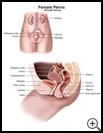
Menstruation: Your Menstrual Cycle
________________________________________________________________________
KEY POINTS
- The menstrual cycle starts on the first day of your period. The average menstrual cycle is 28 days long. However, a normal cycle may be 21 to 35 days long.
- Change sanitary napkins (pads) before the pad is soaked with menstrual flow. Change tampons often and at least every 4 to 8 hours.
- If you have menstrual cramps, take nonprescription pain medicine, use a heating pad on a low setting, or soak in tub of warm water.
________________________________________________________________________
What is the menstrual cycle?
The menstrual cycle starts on the first day of your period. The average menstrual cycle is 28 days long. However, a normal cycle may be 21 to 35 days long.
Menstruation is part of the process your body goes through to get ready for the possibility of pregnancy each month. Changes in body chemicals called hormones make the menstrual cycle happen. In the first half of the menstrual cycle, levels of the hormones estrogen and progesterone rise and make the lining of the uterus grow and thicken.
At about day 14 of a typical 28-day cycle, an ovary releases an egg, called ovulation. The egg travels through a tube called the fallopian tube into the uterus. If the egg is fertilized by a man’s sperm and attaches to the inside of the uterus, you are pregnant. If a man's sperm does not fertilize the egg, hormone levels drop and your uterus sheds the lining it prepared for a baby. When the uterus sheds its lining, blood flows out of your vagina. This is called your period.
Except when they are pregnant, women usually keep having periods until menopause. Menopause means that your ovaries are no longer releasing eggs and you can no longer get pregnant. The average age of menopause is 51. Like menstruation, menopause can be different from woman to woman. Some women have early menopause before 40 years of age because of surgery, illness, or other reasons.
For the first few years after you start having periods, your cycle may be very irregular. Periods may happen anywhere from once a month to 3 times a year. Periods may also be irregular as you near menopause.
Your period may not be the same every month, and it may not be the same as other women's periods. Periods can be light, moderate, or heavy. The amount of blood lost is usually about 2 to 3 tablespoons (29 to 44 ml).
Your period may last from 2 to 7 days. You may know that your period is about to start because your breasts feel tender and you have some cramping in your lower belly. You may have sudden mood changes and bloating, tiredness, and headaches. You may have symptoms before, during, or after your period.
What problems could I have with my menstrual cycle?
Some of the problems you may have with your menstrual cycle include:
- Painful periods, also called menstrual cramps
- Abnormal menstrual bleeding, which includes:
- Very heavy vaginal bleeding
- Unusually long periods
- Bleeding between periods
- Periods that are too close together (closer than 21 days apart)
In teens and in women nearing menopause, hormone problems often cause abnormal menstrual bleeding. Other causes of abnormal bleeding include growths in the uterus called fibroids or polyps.
- Missed menstrual periods, which includes:
- Not starting to menstruate by age 15
- Not having a period for 45 to 90 days
- Pregnancy and while you are breast-feeding
- Menopause
You may also have missed menstrual periods after extreme weight loss caused by serious illness, eating disorders, intense exercise, or stress. Hormone problems can also cause missed periods.
How can I take care of myself during my period?
Change sanitary napkins (pads) before the pad is soaked with menstrual flow. Change tampons often and at least every 4 to 8 hours. Make sure that you use the lowest absorbency of tampon needed for your flow. For example, do not use super absorbency on the lightest day of your period. Using super absorbent tampons can put you at risk for toxic shock syndrome (TSS). TSS is a rare but sometimes deadly infection that happens when toxins (poisons) made by bacteria get into the bloodstream. Using any kind of tampon increases your risk for TSS. You can lower your risk by not using tampons, or by switching between tampons and pads during your period.
Some of the things you can do if you have menstrual cramps are:
- Take nonprescription pain medicine, such as acetaminophen, ibuprofen, or naproxen. Read the label and take as directed. Unless recommended by your healthcare provider, you should not take these medicines for more than 10 days.
- Nonsteroidal anti-inflammatory medicines (NSAIDs), such as ibuprofen, naproxen, and aspirin, may cause stomach bleeding and other problems. These risks increase with age.
- Acetaminophen may cause liver damage or other problems. Unless recommended by your provider, don't take more than 3000 milligrams (mg) in 24 hours. To make sure you don’t take too much, check other medicines you take to see if they also contain acetaminophen. Ask your provider if you need to avoid drinking alcohol while taking this medicine.
- Put a heating pad set on low, or a covered hot water bottle, on your lower back or belly.
- Soak in a warm (not hot) tub.
- Gently massage your lower belly or lower back.
To learn more about menstruation, contact:
- The National Women's Health Information Center (NWHIC)
800-994-9662
http://www.womenshealth.gov/index.php

